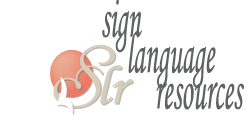Spotlight on The SLR MentorshiP Program: Interview with Amy Rubinger
Who is the ideal participant in the mentorship program? The ideal mentee? The ideal mentor?
The 'ideal' participant is an interpreter who is committed, open minded, flexible and passionate about analyzing their work. This applies to both the mentor and the mentee. The ideal mentor is supportive - creating a safe space for the mentee to engage and be vulnerable. The ideal mentee is willing to BE vulnerable and has defined, clear goals. Ideally, both mentor and mentee are responsive to each other and are respectful of keeping scheduled meetings.
How do you go about pairing mentors and mentees?
Our application asks for both mentors and mentees to go into detail about their daily work environments, their strengths, weaknesses, and their approach/philosophy towards interpreting. I also look at where the mentee wants to work (goals) and/or where they are currently working. I try to pair that mentee with a mentor who has experience in the field that the mentee wants to grow in. From reading the applications I get a feel for personalities and endeavor to match people who I think will work well together. (Since mentors/mentees can meet remotely, location is not so much a determinant to pairing).
Why is this program better than just finding a mentor and having a one-on-one experience?
Our mentorship program usually has anywhere from 4-10 participants in a 3-month cycle. From our kick-off meeting and going forward, I emphasize that we are a community of learners. Participants share resources & experiences. Mentees have the opportunity to 'swap' and work with other mentors during the cycle (facilitated by coordinator - Amy Rubinger). As coordinator I foster group activities such as informal presentations, interpreting practice field-trips and group discussions. I engage with and check in with my participants regularly to see if I can provide support/assistance. Being part of SLR's program allows participants to use GO REACT, gives them access to our newsletter (full of resources/workshop opportunities, etc) as well as future work opportunities.
How have you seen the pairs grow and develop throughout the program? After the program?
YES! Many of our former mentees have gotten certified and have credited our program. Several mentor/mentee pairs choose to continue their work together for 2 or 3 cycles. One pair worked together for a year (in our program). I often receive emails from former mentees letting me know how much this program has helped them in their current work.
What are some of your most memorable experiences from the program?
Field trips that I arranged where we meet as a group and do hands up work in a safe and no risk environment. Informal workshops/presentations that I have facilitated led by mentors and/or mentees.
Some presentations have been:
- Interpreting in Religious settings,
- Considerations in Legal Interpreting,
- Interpreter Stages of Development,
- The benefit of a long term mentor/mentee relationship,
- Discussions regarding ethical decision making
What does mentoring offer to experienced interpreters?
Mentors that have been in the field 20+ years have told me how wonderful it is to work with a new, recently graduated from a program, interpreter. They learn new perspectives and approaches. Interpreting pedagogy grows and evolves - This helps more seasoned interpreters stay current. It really is a learning opportunity for both the mentor and the mentee.
What is your favorite part of the program?
As we build and improve our skills and strengthen our interpreting community, the ultimate beneficiary is the Deaf consumer to whom we provide services. I am honored to be a part of this process.
Applications are now available for the June/July/August cycle of the SLR Mentorship Program!
Visit the Mentorship page for more info!
